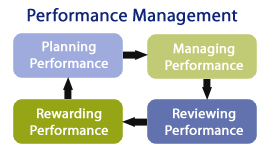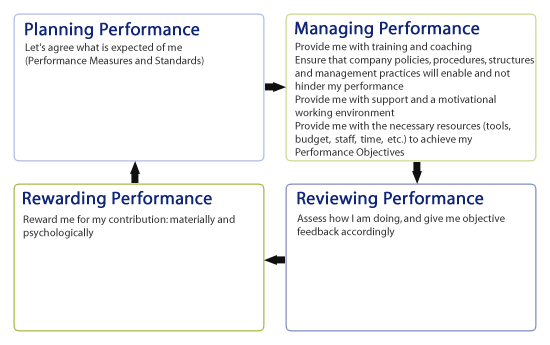|
Definition:
Performance Management
PERFORMANCE
MANAGEMENT is a system and process that links the organization's
goals and strategies to individual and team performance so
as to increase organizational effectiveness.
It is
a joint process that involves both the line manager and the
employee who identify common goals/objectives, which correlate
with the higher goals of the organization. This process results
in the establishment of written performance expectations;
later used as measures for feedback and performance appraisal
(the latter is also known as performance review, assessment
or evaluation).
Performance
Management is about providing direction, clarity and support
to the work that employees do so as to optimize their effectiveness
and efficiency in line with the needs of the organization.
It focuses both on objectives/outcomes (the 'what') and on
style and behaviors (the 'how'), so that it is possible to
assess not only whether employees are achieving their set
individual objectives, but also whether their performance
is in line with the organization's preferred values and culture,
e.g. teamwork, customer focus, interpersonal relationships,
participative management style, etc. (doing the RIGHT THINGS
in the RIGHT WAY).
The model
below illustrates the four stages of Performance Management:

This model
is aligned with the WORK NEEDS of individual employees, which
are as follows:

To provide
for the above needs of employees, let's consider what should
happen at each stage of the Performance Management Cycle:
1.
Planning Performance: Performance objectives for individual
employees (at all levels) are jointly discussed and agreed
during one-on-one, face-to-face meetings between jobholders
and their immediate line managers - normally for a period
of 12 months. (Similarly, objectives could be set for whole
work teams, provided that the team members are totally interdependent,
working towards achieving the same goal/output, i.e. each
team member contributes a portion towards it).
2.
Managing Performance: During this stage employees implement/execute
their agreed objectives. They manage their own performance,
assisted by their line managers who should remove performance
obstacles from the work environment and provide the necessary
resources, training and coaching. Line managers are also responsible
for integrating and coordinating (horizontally and vertically)
the objectives of all their employees/units/teams, monitoring
and controlling their performance, taking corrective action,
and doing joint problem solving as and when necessary. The
leadership, feedback, reinforcement and support they need
to provide them with throughout, are of utmost importance.
Managing Performance is an ongoing,
12 months' activity that actually runs through all the phases
of the Performance Management Cycle. It is the golden thread
of Performance Management.
3. Reviewing Performance: Times for formal Performance
Reviews/Appraisals are decided by top management. Generally,
4- or 6-monthly formal performance appraisals are sufficient.
During these sessions, employees and their direct line managers
discuss (and assess) how well the agreed objectives have been
achieved. Problem areas are identified and corrective actions
planned, including possible training that the employee needs.
4. Rewarding Performance: The actual rating of performance
(how well each objective had been achieved) forms part of
the Performance Review session. Rewarding people for good
performance can take the form of monetary rewards (performance-related
pay such as bonuses and/or salary adjustments). However, the
power of non-monetary rewards, such as praise and recognition,
should not be ignored and needs to enjoy much more emphases
than it generally does.
In practice,
Planning Performance and Reviewing Performance can take place
during one session, called the PERFORMANCE INTERVIEW.
previous
page next
page
|
